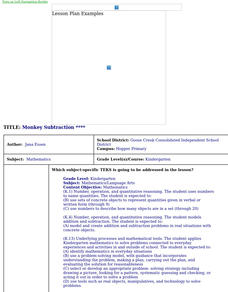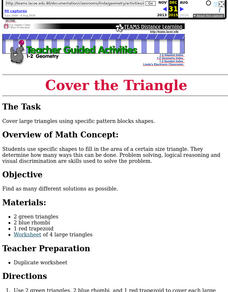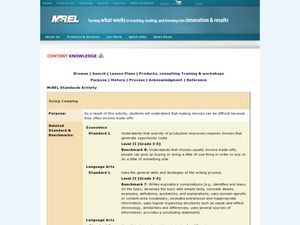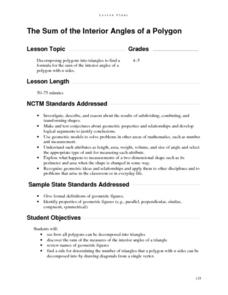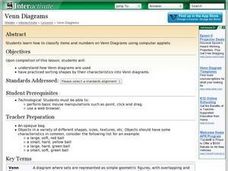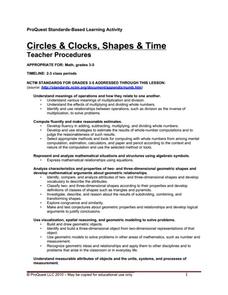Curated OER
Monkey Subtraction
Students listen to the book Five Little Monkeys Sitting In a Tree, identify written numbers 0-9 and the symbol for subtraction; students subtract two single digit numbers using manipulatives, and recite the corresponding number sentence.
Curated OER
Who Plays What?
Ninth graders divide in pairs 3 cards with the words possible, impossible and certain on them. Ask questions of the class and get the students to hold up the word that describes the event (for example) Tomorrow it will snow. You have...
Curated OER
Using Trigonometry
Fifth graders explore the use of trigonometry to find unknown sides and angles in right-angled triangles, taking the concepts that were developed in the previous unit and looking at different ways of practicing the new skills. Students...
Curated OER
Cover the Triangle
Learners explore geometric shapes using pattern blocks. They use specific shapes to fill in triangles, color-in their solutions, and discuss the results with a partner.
Curated OER
Going Camping
Middle schoolers explore the concept of budgeting. In this budgeting lesson, students pretend to have $120 to spend on camping gear for a camping trip. Middle schoolers decide which items are absolutely necessary. Students calculate the...
Illustrative Mathematics
Comparing Rational and Irrational Number
Algebra learners must know how to use rational numbers to approximate irrationals. This resource asks participants to decide which number is larger without using a calculator. It makes a great exercise to use as a five-minute transition...
Improving Measurement and Geometry in Elementary Schools
The Sum of the Interior Angles of a Polygon
Junior geometers discover that polygons can be decomposed into triangles and that the number of triangles can be determined by a rule. Note that the Geometer’s Sketchpad® software is required to carry out all components of this...
Curated OER
Property Lists for Quadrilaterals
Young scholars establish classifications of shapes by various properties (angles, sides, etc.). They introduce the important properties of common shapes. Students develop an awareness of the wide variety of ways the 2-D shapes can be alike.
Curated OER
Venn Diagram Lesson Plan
Students use Venn diagrams in order to classify different objects and numbers. They then use "Venn Diagram Shape sorter" applets on the computer.
Curated OER
Space Crossing
Learners critically follow a chain of reasoning to devise a decent problem solving technique to be applied to a reasonable problem. They also examine how to use logical arguments.
Curated OER
Venn Diagram with Blocks
Fifth graders classify blocks according to their attributes. In this math lesson, 5th graders will identify attributes of blocks, sort them, then form the groups into a Venn Diagram, and write ratios using the attributes.
Curated OER
Getting to the Bottom of the Pyramids
Students work together to develop logical arguments about pyramids and chain letters. They share their ideas with other groups and create a diagram showing the breakdown. They discuss the results.
Curated OER
Adam's Watch
Third graders use their watches to tell the time while the teacher lists their responses on the board along with the reasons for them (set incorrectly, gain/lose time). They solve the problem in pairs and focus their thinking on the...
Curated OER
Lake Crossing II
Students complete the following problem by using logic: Three couples, the Smiths, the Jones and the Browns wanted to go to the Brown's yacht that was moored a little way out in the lake. There was a dinghy to take them to the yacht but...
Curated OER
Multiplication Algorithm (1)
Third graders in a 3rd grade math class make connections from prior instruction and mastery to solve problems in new learning situations. Using logical thinking and prior knowledge to solve current math problems is the focus of this...
Curated OER
Noughts
Students try to figure out the strategies to the game Noughts. Students logic must play a part in the process of the game. Students apply the symmetries of regular polygons. Students devise ways to critically follow a chain of reasoning.
Curated OER
Circles and Clocks, Shapes and Time
Students work in groups to research clocks and practice telling time. For this telling time lesson, students use the computer program ProQuest to study circles, including radius and diameter, and practice drawing circles using a compass....
Curated OER
Exam One Review
In this secondary mathematics activity, students solve problems that involve patterns, arithmetic and geometric sequences, geometric logic and reasoning, and changing bases. The three page activity contains fourteen problems. Answers...
Curated OER
Mathematical Proofs
Students explore the nature of mathematical proofs and mathematical inquiry. They complete the activity "Using the Pythagorean Theorem". They read selected articles and participate in class discussions.
Curated OER
Angle Attributes and Measures
Seventh graders explore the concept of angles. In this angles lesson, 7th graders use protractors to measure angles. Students sing an angle song. Students discuss attributes of angles using a two-color plate manipulative.
Curated OER
That's Not Fair
Fourth graders in pairs, go to the front of the class, where one student is given five pieces of candy in one hand and four in the other. The other student is given four candies in one hand and none in the other. They discuss if they...
Curated OER
Hare and Lynx Population
Fourth graders study changes in animal population. In this graphing lesson, 4th graders create graphs from information read to them about hares and lynx populations. They will describe patterns of change in the graphs and discuss why...
Curated OER
Mathematical Induction
In this Algebra II worksheet, 11th graders explore two examples of arguments that can be formalized with mathematical induction. The one page worksheet contains two problems with explanation.
Curated OER
Weighing Time
Young scholars devise a strategy to solve problems that is done in a systematic and mathematical fashion. The finding of the unknown value is the focus of the lesson. To solve linear equations proficiently is the skill of the lesson.


